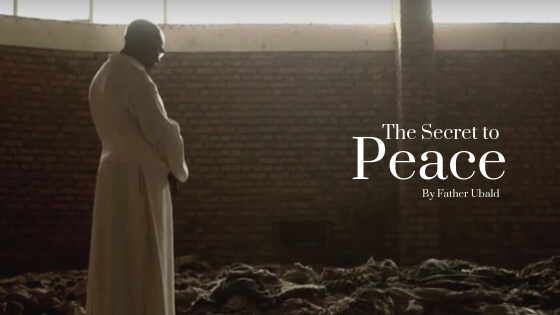Forgiveness.
To forgive is sometimes difficult, but it is always possible:
St. Peter in the parable of the unforgiving Servant (Matthew 18, 21-22) realizes it is not easy to forgive. He asked Jesus how often he must forgive his brother who is sinning against him. St. Peter had already thought about this question and had his own answer. He proposed to forgive his brother seven times; which was really not easy. St. Peter was proud. He was satisfied by his research and wanted confirmation from Jesus. Peter was disappointed when Jesus, instead of thanking him for his answer, proposed to Peter he had to forgive seventy-seven times, which means forgiving every time, even more.
To arrive at such spiritual maturity, there is a spiritual training in the forgiveness process.
When you are the victim of violence you may have many questions in the beginning such as:
What did this happen to me?
Why am I a victim?
Why did this person do this to me?
During this time of questioning and uncertainty you may lose all confidence in other people. You may distance yourself from others. It is a time of thinking, quiet and healing. After a time you may begin to try to live again. Whenever you experience violence, a part of you dies. Before you can forgive you must step back, take a break, and work through your pain in order to heal.
Jean Monbourquette in his book “Comment Pardonner” (How to Forgive) proposes 11 steps to cross before arriving at effective forgiveness:
1. Not to revenge yourself. Don’t waste time speaking about forgiveness to someone who wants to revenge himself. The first step in the forgiveness process is to make the decision to not revenge yourself.
2. To have enough time to think about your inner wounds from the hurt and violence against you. Then make the decision to not do the same thing, to not imitate it.
3. To share your inner wounds from the violence against you with someone else.
4. To have enough time to realize what happened to you. To process your feelings, to feel your feelings, and to heal is an important step and takes time.
5. To realize you can be angry and not have to revenge yourself.
6. To forgive yourself after the disappointment and hurt.
7. To work at overcoming the violence against you by allowing the offender a place in your heart, and/or your life again if possible.
8. To realize that you can forgive because somewhere in your life you have also been forgiven.
9. To understand that you are not obliged to forgive. It is your own decision.
10. To realize that forgiveness is a gift from God.
11. Forgiveness and reconciliation with the offender is possible.
After this long journey of forgiveness, you can forgive forever and can be free from hatred. You are able to enjoy all the fruits and freedom of forgiveness. Such forgiveness makes you free and opens the door for the offender to ask for pardon.
Fr. Ubald Rugirangoga
Center for The Secret of Peace
Cyangugu Diocese, Rwanda
Learn more about Fr. Ubald and his story of forgiveness!

